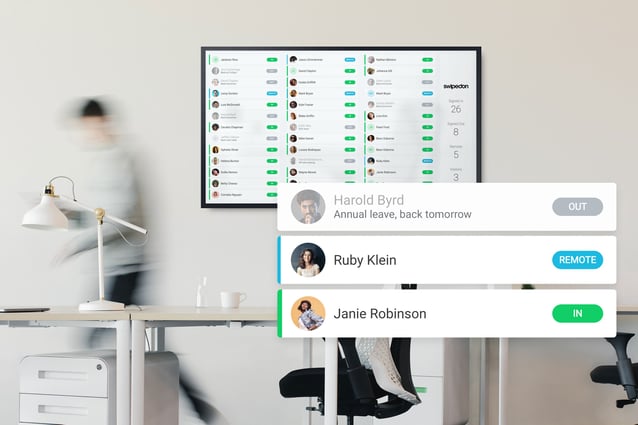9 Ways Technology Can Transform Your Business

Technology is becoming increasingly important in business and driving transformation in all elements of operations. Charles Darwin said, “It is not the strongest of the species that survives, nor the most intelligent that survives. It is the one that is the most adaptable to change.”
The crux of it is, that the ability to adapt to new ways of doing things is essential for your success.
As of 2020, 97% of respondents to a Statista survey agreed that the pandemic had accelerated the digital transformation in their companies. This adoption is destined to increase, given that expenditure on digital transformation (DX) is expected to reach $1.8 trillion this year.
Spending on digital transformation from 2017 to 2025 (Image Source)
Technology has revolutionized businesses, gradually altering the traditional “9 to 5” work model and reinventing how companies do things. It seems that flexible and hybrid work arrangements are here to stay, so what other changes can we expect to see in the near future? Based on industry insights, we’ve highlighted nine ways technology will transform businesses this year.
- Hybrid work
- Employee recruitment
- Workplace transparency
- Performance measurement
- QR codes
- Contract management
- Employee bandwidth
- Cybersecurity
- Compliance
1. Hybrid work will become smoother and easier
Thanks to technology, the traditional model of working in a conventional office building has been altered for good. Although telecommuting has been around for a long time, it has played an increasingly important role since the COVID-19 pandemic forced office employees to work from home for personal safety.
Implementing a smart and simple desk-booking solution helps businesses maximize the benefits hybrid work arrangements offer, such as better productivity, employee satisfaction, and cost-effectiveness.

2. Businesses can attract and hire better candidates
In the past, HR departments have typically been occupied with manual tasks. They spent their time juggling paper resumes, personal phone calls, and tedious administrative tasks instead of focusing on the company's most valuable asset: talent. Technology, social media recruiting, software, and online tools are rapidly changing the HR ecosystem and recruiting models.
Recent research on Statista indicates increased use of AI in hiring across all sample countries from 2016 to 2020. Likewise, a study by CareerBuilder shows that 60% of employers check the content of job applicant's social media accounts before hiring. The development of mobile-first recruitment strategies coupled with the availability of relevant technology allows organizations to track talent globally and find candidates that best fit their business needs.
3. Technology helps foster a more transparent workplace
Technology can help create an inclusive workplace by allowing people from different countries can work together. Software systems like Slack and MS Teams can also promote a more inclusive culture within the company by enhancing transparency and giving employees equal opportunities to take part in communication and share different perspectives and cultural backgrounds.
A digital sign in system like SwipedOn can be used to increase transparency between team members with features like an in and out board, where people can see a live view of where their colleagues are that day.

4. Performance can be measured more accurately
Accurately measuring performance provides businesses with the data to evaluate growth and identify areas that need optimization. Old-fashioned manual processes can fail to track important metrics like productivity, profitability, quality, and cost. Technology has transformed performance evaluation by introducing monitoring tools enabling organizations to precisely calculate sales and employee performance metrics.
It also helps in quickly identifying performance trends and anomalies. As a result, viewing progress towards business goals, feedback, and employee performance measurement data in one place provides 100% performance transparency.
5. QR codes are here to stay
A side effect of the pandemic is that QR code usage is on the rise. QR codes are an easy way to direct traffic to the web page you want your customers to see - be it a landing page, a product page, or an about us page.
Another use for QR codes is to offer contactless QR sign in for visitors and employees.
Visitors can scan generated codes on their smartphones and enter the required details. With convenient innovations like this, customers have better experiences, which can transform into strong relationships between you and your customers.
6. Technology makes contract management easier
Electronic contracts have many advantages over paper contracts in terms of legal validity, security, and efficiency of use. They also save time, effort, and cost and reduce your impact on the environment.
According to Msbdocs, eSignature transactions have increased from 89 million to 754 million over just five years and this trend is likely to continue.
7. Employees have more time to work on important tasks
Remote and hybrid workers experience less direct stress and distractions than in the office and have more time to work on essential tasks due to fewer breaks and sick days. The right technology empowers employees with simplified methods for a range of tasks like hot desk booking, meeting visitors, paperwork management, and more. As a result, many have more energy and enthusiasm to contribute to their core roles and responsibilities.

Streamlined processes and automation of tedious, time-consuming, and error-prone manual tasks are additional valuable benefits of implementing technology. This frees them up from repetitive mundane duties that are a waste of their skills and expertise. Thus, employees can stay motivated and invest their time and energy in substantial, specialized activities.
8. Businesses will be able to enhance cybersecurity
According to recent research, the U.S., U.K., and Canada are experiencing a dramatic increase in cyber breaches. The average cost per case marked a yearly surge of two-thirds in 2018, and IBM reports an average data breach cost of $4.24 million as of 2021.
Cyber security solutions provide digital protection for your company, ensuring that your systems are not vulnerable to threats and breaches. Security-centered technologies like guest management systems provide instantaneous visitor alerts, improved visibility, photo capture, ID badges, and secure digital agreements. This minimizes costly security issues and increases productivity.
9. Technology can help meet regulatory requirements
Regulatory compliance protects your company's information and builds a good reputation as well as trust with staff and customers. Technology has increased the efficiency of data collection and storage—and the volume of data being collected makes data security imperative.
A workplace sign in solution allows digital data collection, storage, and processing in secure systems as designated by the EU–US Privacy Shield. They help businesses adhere to GDPR and other data privacy regulations. A workplace sign in system provides digital logs, keeping visitor information private. You can also use a set of built-in tools to anonymize or archive visitor or employee data, making sure that no personal data is kept for longer than required.

Staying ahead of the trend with innovation and advancement can help your businesses benefit from the expanded capacities technology offers. Many companies have introduced hybrid work and remote to their workplace management, and many will soon begin to do so. Adapting to the new tech-driven business realities will help you gain a competitive edge and thrive at a time of transformation.
Photo by Ross Findon on Unsplash








 Germany - Deutsch
Germany - Deutsch